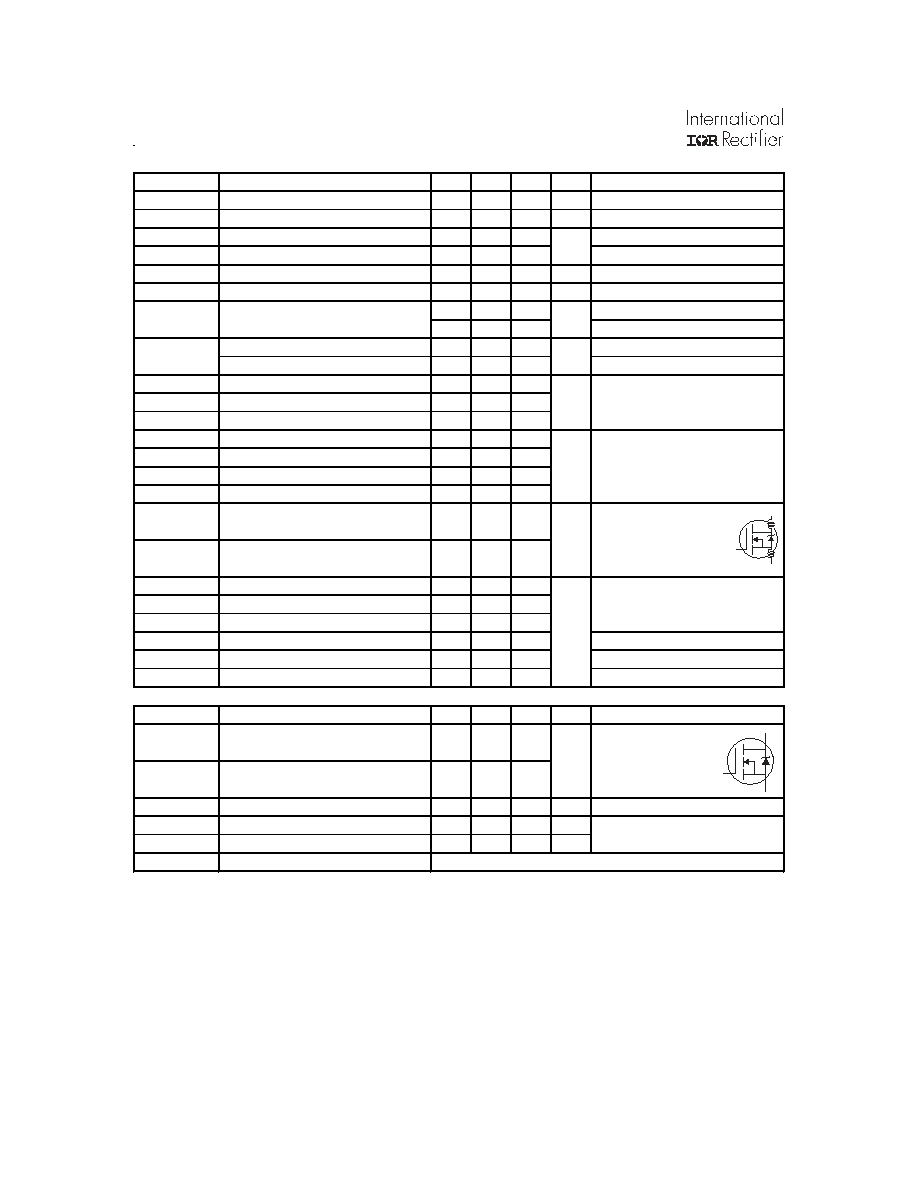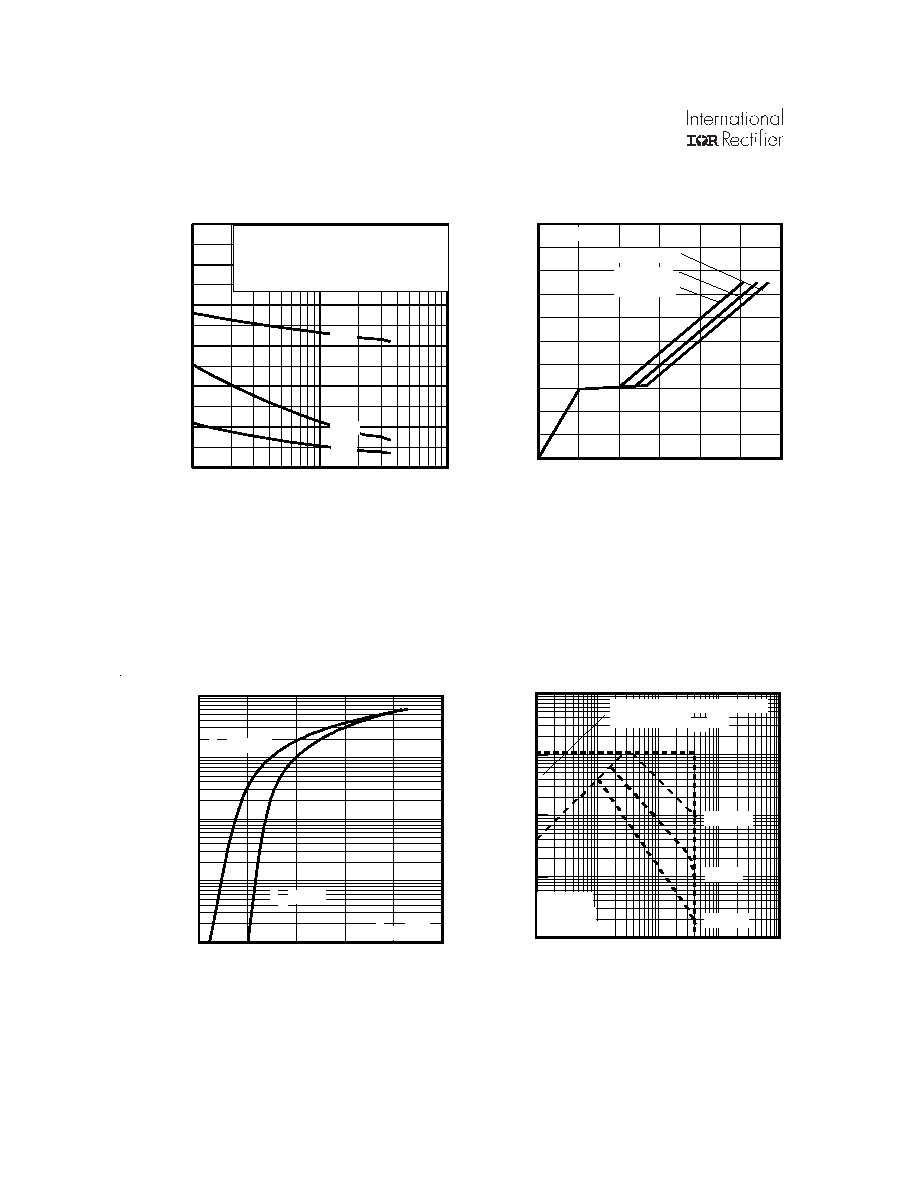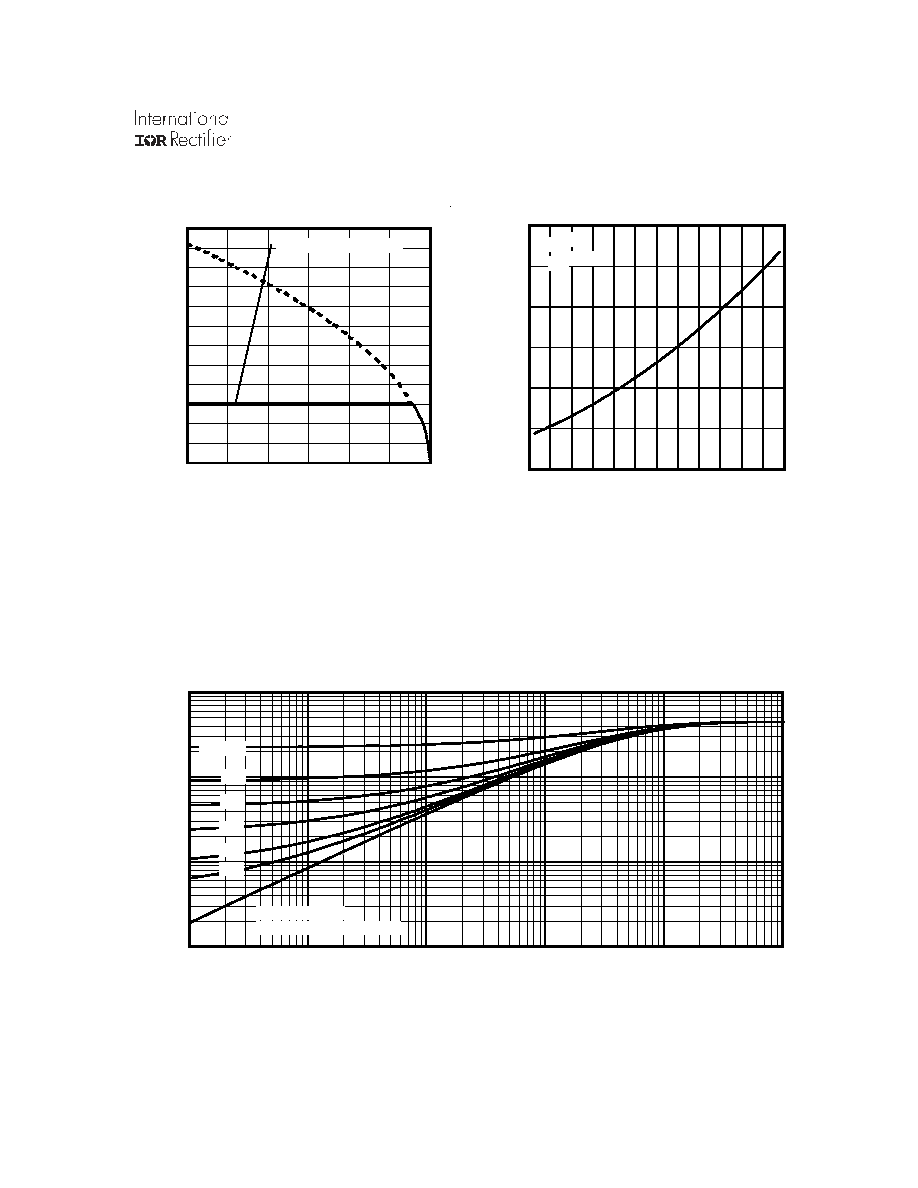
IRF2804
IRF2804S
IRF2804L
HEXFET
®
Power MOSFET
V
DSS
= 40V
R
DS(on)
= 2.0m
I
D
= 75A
08/27/03
www.irf.com
1
AUTOMOTIVE MOSFET
HEXFET
®
is a registered trademark of International Rectifier.
Description
Specifically designed for Automotive applications,
this HEXFET
®
Power MOSFET utilizes the latest
processing techniques to achieve extremely low
on-resistance per silicon area. Additional features
of this design are a 175°C junction operating
temperature, fast switching speed and improved
repetitive avalanche rating . These features com-
bine to make this design an extremely efficient
and reliable device for use in Automotive applica-
tions and a wide variety of other applications.
S
D
G
Features
l
Advanced Process Technology
l
Ultra Low On-Resistance
l
175°C Operating Temperature
l
Fast Switching
l
Repetitive Avalanche Allowed up to Tjmax
D
2
Pak
IRF2804S
TO-220AB
IRF2804
TO-262
IRF2804L
Absolute Maximum Ratings
Parameter
Units
I
D
@ T
C
= 25°C
Continuous Drain Current, V
GS
@ 10V (Silicon Limited)
A
I
D
@ T
C
= 100°C
Continuous Drain Current, V
GS
@ 10V (See Fig. 9)
I
D
@ T
C
= 25°C
Continuous Drain Current, V
GS
@ 10V
(Package Limited)
I
DM
Pulsed Drain Current
c
P
D
@T
C
= 25°C
Maximum Power Dissipation
W
Linear Derating Factor
W/°C
V
GS
Gate-to-Source Voltage
V
E
AS
Single Pulse Avalanche Energy (Thermally Limited)
d
mJ
E
AS
(tested)
Single Pulse Avalanche Energy Tested Value
i
I
AR
Avalanche Current
c
A
E
AR
Repetitive Avalanche Energy
h
mJ
T
J
Operating Junction and
°C
T
STG
Storage Temperature Range
Soldering Temperature, for 10 seconds
Mounting torque, 6-32 or M3 screw
Thermal Resistance
Parameter
Typ.
Max.
Units
R
JC
Junction-to-Case
0.45
°C/W
R
CS
Case-to-Sink, Flat, Greased Surface
0.50
R
JA
Junction-to-Ambient
62
R
JA
Junction-to-Ambient (PCB Mount, steady state)
j
40
Max.
280
200
1080
75
10 lbf·in (1.1N·m)
330
2.2
± 20
670
1160
See Fig.12a,12b,15,16
300 (1.6mm from case )
-55 to + 175
PD - 94436C

IRF2804/S/L
2
www.irf.com
Notes:
Repetitive rating; pulse width limited by
max. junction temperature. (See fig. 11).
Limited by T
Jmax
, starting T
J
= 25°C,
L=0.24mH, R
G
= 25
, I
AS
= 75A, V
GS
=10V.
Part not recommended for use above this value.
I
SD
75A, di/dt
220A/µs, V
DD
V
(BR)DSS
,
T
J
175°C.
Pulse width
1.0ms; duty cycle
2%.
C
oss
eff. is a fixed capacitance that gives the same
charging time as C
oss
while V
DS
is rising from 0 to 80%
V
DSS
.
Limited by T
Jmax
, see Fig.12a, 12b, 15, 16 for typical repetitive
avalanche performance.
This value determined from sample failure population. 100%
tested to this value in production.
This is applied to D
2
Pak, when mounted on 1" square PCB
( FR-4 or G-10 Material ). For recommended footprint and
soldering techniques refer to application note #AN-994.
Max R
DS(on)
for D
2
Pak and TO-262 (SMD) devices.
S
D
G
S
D
G
Static @ T
J
= 25°C (unless otherwise specified)
Parameter
Min. Typ. Max. Units
V
(BR)DSS
Drain-to-Source Breakdown Voltage
40
V
V
DSS
/
T
J
Breakdown Voltage Temp. Coefficient
0.031
V/°C
R
DS(on)
SMD
Static Drain-to-Source On-Resistance
1.5
2.0
m
R
DS(on)
TO-220 Static Drain-to-Source On-Resistance
1.8
2.3
V
GS(th)
Gate Threshold Voltage
2.0
4.0
V
gfs
Forward Transconductance
130
S
I
DSS
Drain-to-Source Leakage Current
20
µA
250
I
GSS
Gate-to-Source Forward Leakage
200
nA
Gate-to-Source Reverse Leakage
-200
Q
g
Total Gate Charge
160
240
nC
Q
gs
Gate-to-Source Charge
41
62
Q
gd
Gate-to-Drain ("Miller") Charge
66
99
t
d(on)
Turn-On Delay Time
13
ns
t
r
Rise Time
120
t
d(off)
Turn-Off Delay Time
130
t
f
Fall Time
130
L
D
Internal Drain Inductance
4.5
nH
Between lead,
6mm (0.25in.)
L
S
Internal Source Inductance
7.5
from package
and center of die contact
C
iss
Input Capacitance
6450
pF
C
oss
Output Capacitance
1690
C
rss
Reverse Transfer Capacitance
840
C
oss
Output Capacitance
5350
C
oss
Output Capacitance
1520
C
oss
eff.
Effective Output Capacitance
2210
Diode Characteristics
Parameter
Min. Typ. Max. Units
I
S
Continuous Source Current
280
(Body Diode)
A
I
SM
Pulsed Source Current
1080
(Body Diode)
Ã
V
SD
Diode Forward Voltage
1.3
V
t
rr
Reverse Recovery Time
56
84
ns
Q
rr
Reverse Recovery Charge
67
100
nC
t
on
Forward Turn-On Time
Intrinsic turn-on time is negligible (turn-on is dominated by LS+LD)
V
DS
= 32V
V
GS
= 10V
f
Conditions
V
GS
= 0V, I
D
= 250µA
Reference to 25°C, I
D
= 1mA
V
GS
= 10V, I
D
= 75A
f
V
GS
= 10V, I
D
= 75A
f
T
J
= 25°C, I
F
= 75A, V
DD
= 20V
di/dt = 100A/µs
f
T
J
= 25°C, I
S
= 75A, V
GS
= 0V
f
showing the
integral reverse
p-n junction diode.
V
GS
= 0V, V
DS
= 1.0V, = 1.0MHz
V
GS
= 10V
f
MOSFET symbol
V
GS
= 0V
V
DS
= 25V
V
GS
= 0V, V
DS
= 32V, = 1.0MHz
Conditions
V
GS
= 0V, V
DS
= 0V to 32V
= 1.0MHz, See Fig. 5
V
DS
= V
GS
, I
D
= 250µA
V
DS
= 40V, V
GS
= 0V
V
DS
= 40V, V
GS
= 0V, T
J
= 125°C
R
G
= 2.5
I
D
= 75A
V
DS
= 10V, I
D
= 75A
V
DD
= 20V
I
D
= 75A
V
GS
= 20V
V
GS
= -20V

IRF2804/S/L
www.irf.com
3
Fig 2. Typical Output Characteristics
Fig 1. Typical Output Characteristics
Fig 3. Typical Transfer Characteristics
Fig 4. Typical Forward Transconductance
vs. Drain Current
0.1
1
10
100
VDS, Drain-to-Source Voltage (V)
1
10
100
1000
10000
I D
,
D
r
a
i
n
-
t
o
-
S
o
u
r
c
e
C
u
r
r
e
n
t
(
A
)
4.5V
20µs PULSE WIDTH
Tj = 25°C
VGS
TOP 15V
10V
8.0V
7.0V
6.0V
5.5V
5.0V
BOTTOM 4.5V
4.0
5.0
6.0
7.0
8.0
9.0
VGS, Gate-to-Source Voltage (V)
1
10
100
1000
I D
,
D
r
a
i
n
-
t
o
-
S
o
u
r
c
e
C
u
r
r
e
n
t
(
)
TJ = 25°C
TJ = 175°C
VDS = 10V
20µs PULSE WIDTH
0
40
80
120
160
200
ID, Drain-to-Source Current (A)
0
50
100
150
200
250
300
G
f
s,
F
o
r
w
a
r
d
T
r
a
n
s
c
o
n
d
u
c
t
a
n
c
e
(
S
)
TJ = 25°C
TJ = 175°C
VDS = 10V
20µs PULSE WIDTH
0.1
1
10
100
VDS, Drain-to-Source Voltage (V)
10
100
1000
10000
I D
,
D
r
a
i
n
-
t
o
-
S
o
u
r
c
e
C
u
r
r
e
n
t
(
A
)
4.5V
20µs PULSE WIDTH
Tj = 175°C
VGS
TOP 15V
10V
8.0V
7.0V
6.0V
5.5V
5.0V
BOTTOM 4.5V
V
GS
TOP 15V
10V
8.0V
7.0V
6.0V
5.5V
5.0V
BOTTOM 4.5V

IRF2804/S/L
4
www.irf.com
Fig 8. Maximum Safe Operating Area
Fig 6. Typical Gate Charge vs.
Gate-to-Source Voltage
Fig 5. Typical Capacitance vs.
Drain-to-Source Voltage
Fig 7. Typical Source-Drain Diode
Forward Voltage
0
1
10
100
1000
VDS , Drain-toSource Voltage (V)
1
10
100
1000
10000
I D
,
D
r
a
i
n
-
t
o
-
S
o
u
r
c
e
C
u
r
r
e
n
t
(
A
)
Tc = 25°C
Tj = 175°C
Single Pulse
1msec
10msec
OPERATION IN THIS AREA
LIMITED BY RDS(on)
100µsec
1
10
100
VDS, Drain-to-Source Voltage (V)
0
2000
4000
6000
8000
10000
12000
C
,
C
a
p
a
c
i
t
a
n
c
e
(
p
F
)
Coss
Crss
Ciss
VGS = 0V, f = 1 MHZ
Ciss = Cgs + Cgd, Cds SHORTED
Crss = Cgd
Coss = Cds + Cgd
0
40
80
120
160
200
240
QG Total Gate Charge (nC)
0
4
8
12
16
20
V
G
S
,
G
a
t
e
-
t
o
-
S
o
u
r
c
e
V
o
l
t
a
g
e
(
V
)
VDS= 32V
VDS= 20V
VDS= 8.0V
ID= 75A
0.2
0.6
1.0
1.4
1.8
2.2
VSD, Source-toDrain Voltage (V)
0.1
1.0
10.0
100.0
1000.0
I S
D
,
R
e
v
e
r
s
e
D
r
a
i
n
C
u
r
r
e
n
t
(
A
)
TJ = 25°C
TJ = 175°C
VGS = 0V

IRF2804/S/L
www.irf.com
5
Fig 11. Maximum Effective Transient Thermal Impedance, Junction-to-Case
Fig 9. Maximum Drain Current vs.
Case Temperature
1E-006
1E-005
0.0001
0.001
0.01
0.1
t1 , Rectangular Pulse Duration (sec)
0.001
0.01
0.1
1
T
h
e
r
m
a
l
R
e
s
p
o
n
s
e
(
Z
t
h
J
C
)
0.20
0.10
D = 0.50
0.02
0.01
0.05
SINGLE PULSE
( THERMAL RESPONSE )
Fig 10. Normalized On-Resistance
vs. Temperature
-60 -40 -20 0
20 40 60 80 100 120 140 160 180
TJ , Junction Temperature (°C)
0.5
1.0
1.5
2.0
R
D
S
(
o
n
)
,
D
r
a
i
n
-
t
o
-
S
o
u
r
c
e
O
n
R
e
s
i
s
t
a
n
c
e
(
N
o
r
m
a
l
i
z
e
d
)
ID = 75A
VGS = 10V
25
50
75
100
125
150
175
TC , Case Temperature (°C)
0
50
100
150
200
250
300
I D
,
D
r
a
i
n
C
u
r
r
e
n
t
(
A
)
LIMITED BY PACKAGE




